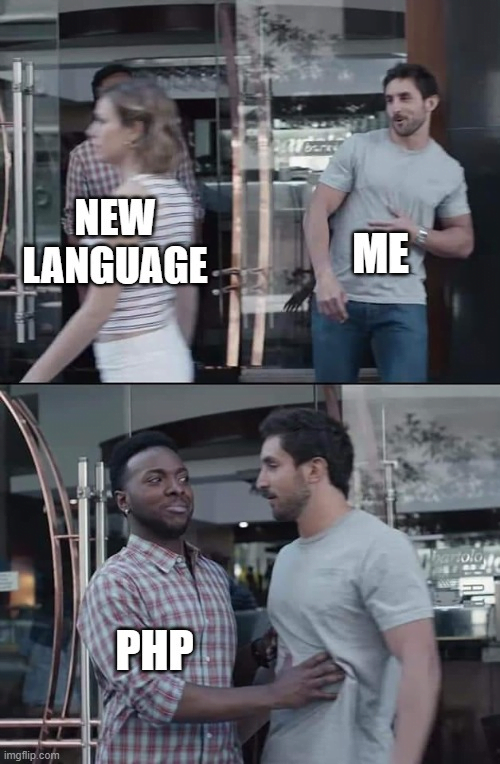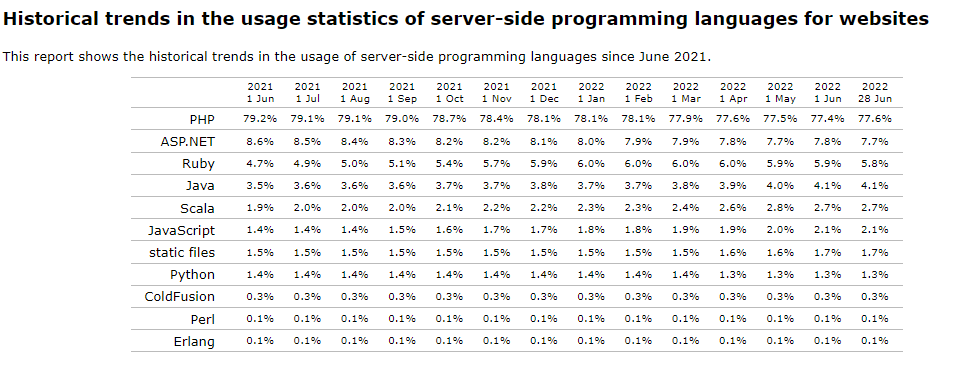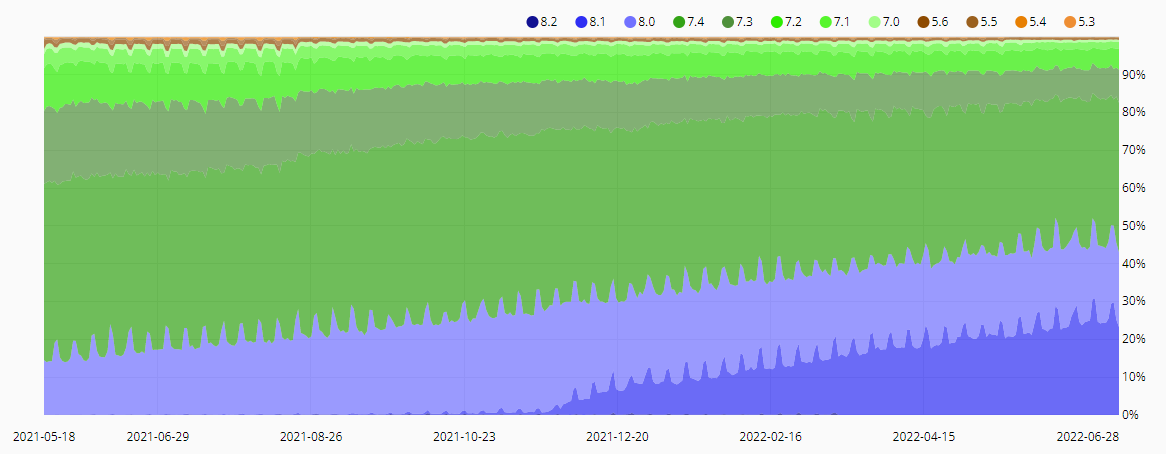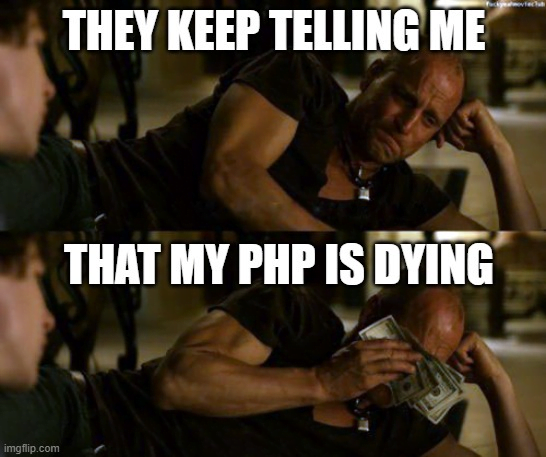PHP 8.2: ¿Qué hay de nuevo?
La nueva versión de PHP está a la vuelta de la esquina. ¿Cuáles son las nuevas implementaciones que debe conocer? Consulte este artículo para saberlo.
 VOLVER
VOLVER
Como desarrollador de PHP aún recuerdo los días de PHP4, la primera implementación (¡opcional!) de GC en PHP5, y viví el _hype_ de la llegada de PHP7 y sus ramificaciones.
A lo largo de los años mucha gente me ha preguntado por qué me molesto en programación en PHPy durante muchos años he escuchado como un mantra dos argumentos recurrentes por los que debería dejar de escribir y empezar a escribir software comercial en lenguajes como Java o C#.
Hoy voy a citar esos argumentos e intentar cambiar tu actitud hacia PHP al menos un poco. Sí, el título de este artículo es un clickbait absurdo.

PHP está muriendo año tras año. El que fuera el lenguaje web más popular está perdiendo popularidad mes a mes, sobre todo a causa de JavaScript.
Cuando se analizan las cifras, la verdad da que pensar. En el último año, PHP perdió un asombroso 1,6% de su cuota como lenguaje backend de la Web.
Si PHP continúa esta tendencia a la baja, en 18 años PHP ¡caerá por debajo de 50% de la tecnología Web backend!

Pero bueno, bromas aparte - aunque las cifras son reales según W3CTechs.
La primera mención que PHP está muriendo se puede encontrar en la web desde 2013. En aquel entonces Software Gunslinger publicó un artículo (¡que por cierto recomiendo encarecidamente!) diciendo que PHP morirá porque no soporta procesos de larga duración y porque carece de asincronía.
Y eso es un hecho, PHP ¡no estaba hecho para eso!
si todo lo que tienes es un martillo, todo parece un clavo
Pero volvamos a las cifras: echemos un vistazo a los datos del año pasado sobre PHP versiones utilizadas en los paquetes Packagist. Los datos más recientes están disponibles en el sitio de origen packagist.org

¿Es ésta la curva de adopción de las nuevas versiones de un lenguaje de programación moribundo?
Por si fuera poco, comparemos nuestra "tasa de mortalidad PHP" con la de otros idiomas.
Los datos para el análisis proceden deGitHut 2.0que genera un gráfico del número de git push por idioma al Github desde 2012, según el esquema - "La distribución porcentual de idiomas en el gráfico de líneas muestra los 10 idiomas principales (o seleccionados manualmente) desde 2012/Q2".

Como puede ver PHP así como otras lenguas populares como RubyC/C++, Python han experimentado una importante caída de popularidad en Github en los últimos años, sin embargo hay una tendencia al alza y esperamos que vuelvan a posiciones altas tras un periodo lateral más largo. (esto no es un consejo de inversión)
La primera bombo para el lenguaje Javascript puede verse en el mismo gráfico. Ya le dejo a usted, querido lector, las conclusiones y su análisis.

Pero un idioma en vías de extinción no debería aumentar el número de ofertas de trabajo para programadores, ¿verdad?

En el momento de escribir este artículo, puedo elegir entre 171 ofertas de trabajo en uno de los principales portales de empleo de Poloniade los cuales 50 son para jóvenes. PHP se está muriendo, ¿verdad?

Y hablando de dinero... ¿sabías que PHP y su fuente código se mantiene desde noviembre de 2021 por el Código abierto independiente comunidadLa Fundación PHP que paga mucho dinero a los desarrolladores OpenSource por sus contribuciones a php-src?
A diferencia de otros lenguajes y frameworks, que suelen ser propiedad de grandes empresas, el núcleo de desarrollo equipo se paga directamente desde la cuenta de la fundación, que funciona gracias a las aportaciones de empresas privadas como JetBrains y Symfony Corp, pero también depequeñas contribuciones de promotores individuales.
Código abierto en todo su esplendor
Sí, este argumento siempre sale de la boca de los desarrolladores que se han familiarizado con lenguajes fuertemente tipados y comparables.
Observando el gráfico de los datos recogidos durante laEncuesta StackOverflow de 2021, se puede ver que nada menos que 10.834 encuestados, que representan casi 60% del total, consideran que PHP es "pésimo".

Como miembro de la vieja escuela Programador PHPEntiendo por qué es así. Inmediatamente me acuerdo de un ejemplo clásico de problemas de memoria en PHP:
<?php
clase FOO {
public $f;
}
clase BAR {
public $f;
}
while(1) {
$a = nuevo FOO();
$b = nuevo BAR();
$a->f = $b;
$b->f = $a;
print "Uso de memoria: " . number_format(memory_get_usage(true)) . " bytesn";
unset($a);
unset($b);
}Para los no iniciados - sí, el código anterior provoca un error de memoria. Y aún hay más. Desde la denominación idiota de los métodos y la completa falta de lógica en el orden de sus parámetros (sí, a todos nos encanta str_ y array_) al error más famoso de PHP T_PAAMAYIM_NEKUDOTAYIM - El PHP está lleno de rarezas y vicios de las versiones antiguas. Esto no significa que lo que hemos oído hablar de PHP hace unos años sigue siendo cierto. El lenguaje ha sufrido una enorme metamorfosis y hoy me alegro de ver mis definiciones de objetos:
readonly class EventoNotificación
{
función pública __construct(
public cadena $context,
public usuario $user,
public string $body,
public DateTime $issuedAt,
) {}
}Además, el Ecosistema PHP ha crecido enormemente, y ahora tenemos increíbles oportunidades de crear código bueno, altamente tipado y bien probado. Podemos utilizar Symfony desarrollar aplicaciones DDD sin mayores problemas, y podemos solucionar el problema de la sincronicidad de PHP utilizando el Bus de Mensajes.
Y aunque yo mismo no creo PHP es adecuado para crear procesos backend de larga duración y tiene enormes problemas de rendimiento cuando se trata de la sincronización de estados, también hecreó un juego de consola PHP usando Symfony + Docker con mis propias manos como ejemplo de que PHP aún puede tener usos poco convencionales.
Otro ventaja de PHP es su baja barrera de entrada para los nuevos desarrolladores. Las documentaciones de dos frameworks populares Symfony yLaravel y PHP documentación en sí son suficientes para entrar en el mundo backend con su ayuda. Un mundo que no es perfecto en PHP pero que permite mucho. Usando librerías adicionales como Laravel Nova somos capaces de crear casi cualquier componente de nuestro sistema con tan solo dos comandos.
Es PHP ¿Muriendo?
No, pero tiene un problema de imagen y necesita mucho trabajo para mejorarlo. Nosotros, los programadores, tenemos que hacer este trabajo enseñando a la nueva generación y transmitiendo las mejores prácticas en forma de artículos, bibliotecas y consejos.
Como lengua que ha sido en el mercado veinte años, que ya ha sobrevivido a más de una bombo (¿recuerdas Objective-C?) Creo que se las arreglará y encontrará su nicho.
Y quién sabe, ¿quizá mis predicciones resulten acertadas y PHP 10.x vuelva a estar en auge dentro de dos años?
